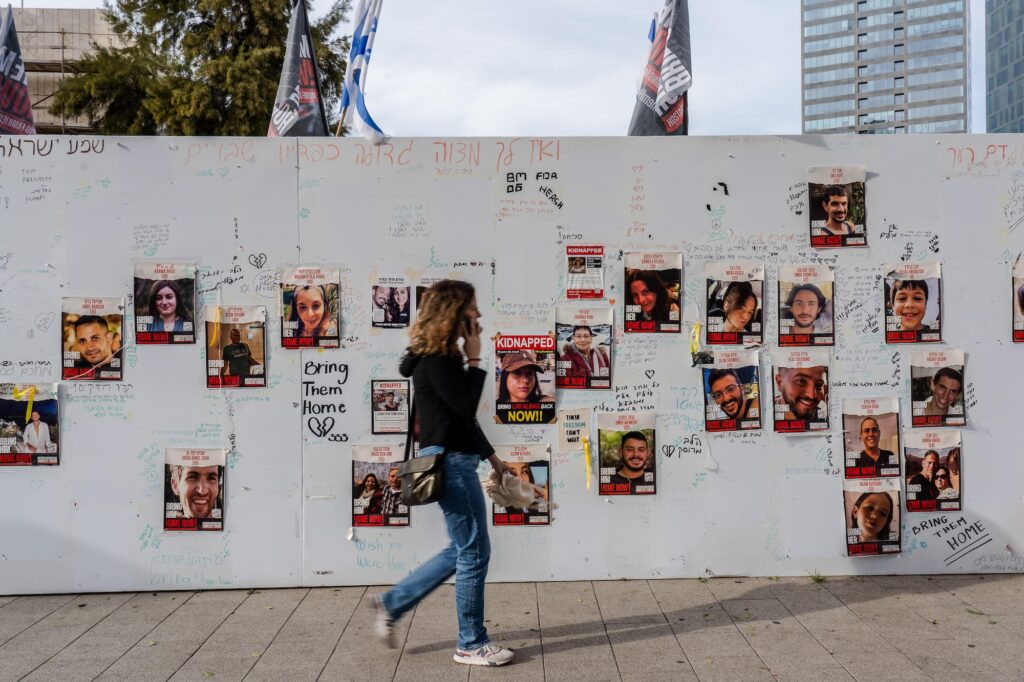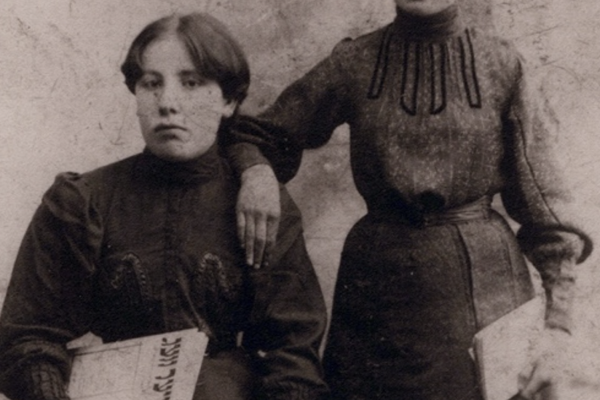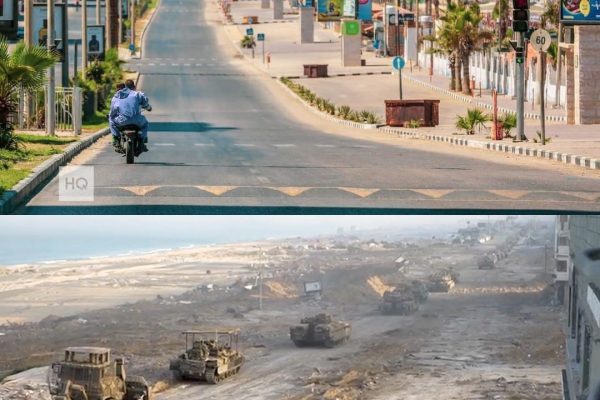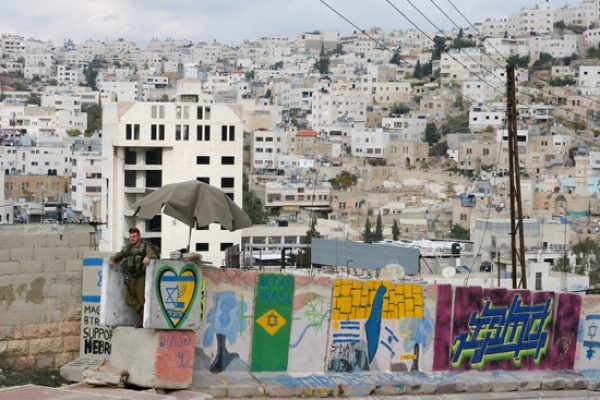It is Saturday morning in Tel Aviv. 147 days have gone by since the morning of Saturday October 7.
Nothing can be said without mentioning the number of dead but nothing seems more meaningless. We say these numbers and do not understand what we say. Around 1,200 Israelis were killed on October 7, of them around 370 soldiers and 800 civilians; 242 Israeli soldiers have been killed since Israel’s offensive began; 239 hostages were taken by Hamas on October 7, of which over 100 have been released; close to 30,000 Palestinians have been killed in the Gaza Strip, a vast majority of them civilians; over 390 Palestinians have been killed in the West Bank and East Jerusalem. By the time you read this these figures will be obsolete. But whichever way you count you come up short. You cannot count the magnitude of loss.
All of us, in Israel, have been driven to madness. Our madness is the constant failure to make sense of reality without distorting it, the failure to describe reality truthfully, and the failure to imagine a future other than the continual accrual of whatever this is. The madness is the desire to kill, to destroy. It is the common view that even in death there is not enough place for everyone, that the conflict continues past life, that not all dead are equal, not all suffering real, not all children innocent.
The slaughter of October 7 is being constantly relived in Israel, while new, ghastly details about what happened keep emerging. The stories of the hostages who have returned and the fear for the hostages who are still being held consume all attention. Photos of the hostages are everywhere: on street benches, buses, billboards, projected from giant screens normally used for advertisements. We know their faces and names. We go to demonstrations to support the families who are begging for their loved ones to be freed. And yet—here is the madness again—the hostages are being abandoned. The desire to retaliate is greater than the commitment to bringing them back. They are honored and forsaken; honored so they can be forsaken.
“Together we will be Victorious” reads the slogan that hangs on bridges and skyscrapers, written at the bottom of the TV screen and on products in the supermarket. Enormous Israeli flags cover office and government buildings; flags hang above highways; flags welcome people at their workplace, at the mall, at school, at university, at the hospital; flags fly along main roads, in roundabouts, at the entrance to every city and village; flags are seen on cars, shop windows, in elevators, and in almost every screen or publication; tiny flags even appear on the icons of Israeli phone apps. “United!” “Victory!” “ISRAEL!” Over 120,000 Israelis have been evacuated from towns close to the Gaza Strip and along Israel’s northern border, which Hezbollah has been attacking daily. Those displaced are struggling to get by. The feeling of emergency is ongoing.
Every day the news shows photographs of the soldiers who died the previous day. Occasionally Hamas releases videos of hostages—they look sick, thin, desperate, completely helpless. But they are alive. “Bring them home, now! Now! Now!” the chant goes. Every once in a while, another hostage is reported dead, sometimes killed by Hamas, sometimes killed accidentally by Israeli soldiers or Israeli bombs.
Underneath all this there is a menacing silence. The catastrophe in the Gaza Strip, if it is mentioned at all, appears to Israelis only as a “challenge”: a PR challenge in international media, a legal challenge in the Hague, a diplomatic challenge in meetings with foreign officials. For the Israeli public, there are merely appearances of suffering in Gaza. Just as Palestinian existence and experience have been erased over the decades from Israeli consciousness, so is the reality of current Palestinian death and loss being denied and concealed. There is no tolerance for the mention of the nearly 2 million internal refugees in Gaza, of widespread starvation, of disease, of the destruction of around 70 percent of the houses in the Gaza Strip, of the incredible proportion of civilian deaths, of whole families that have been wiped off the face of the earth. Any serious consideration of Palestinian loss is perceived as a distraction from the suffering of Israelis, as an affront and a failure of loyalty.
Even if many Israelis genuinely believe that what is being done in Gaza is necessary for Israel’s defense and therefore justified, why should they deny, ignore, or resent any acknowledgment of Palestinian agony? Why is it that Israelis cannot lament the destruction carried out in their name? It might seem easy to dismiss this question as naïve. People often disregard the humanity of those they see as a threat to their existence. But this does not answer the question. Even if there is an explanation for why Israelis see so many innocent children, women, and men as a threat to their existence, it remains unclear why the lives of these people do not appear real and meaningful to them. The same Israelis who call for the destruction of Gaza and rejoice in the images of its ruin view the suffering that results from the very same destruction as nothing but a façade, a lie, a deceptive manipulation of the narrative. And while some do not deny the suffering of Palestinians, they often say they cannot—will not—feel any sorrow or sympathy for it.
Perhaps this intolerance has to do with the exclusivity of loss. When looked at directly, or through the eyes of those who loved the dead, each loss is endless and leaves room for nothing else. Each loss stands alone as the complete destruction of the whole world. To deny the exclusivity of loss is to deny its magnitude and significance. Yet somehow this truth must be reconciled with the undeniable plurality of loss. Each one of the innumerous losses of the last five months destroyed the whole world all by itself. When we deny this difficult combination—that each loss is everything and that it is one of many—we deny all loss. Nevertheless, the more loss there is, the more difficult it is to acknowledge it precisely because of what such acknowledgment demands of us. This is another aspect of our madness: our denial of loss grows in proportion to its reality.
But Israelis’ deliberate obliviousness to Palestinian suffering cannot be fully explained by the paradox of loss. To understand it we must consider the essence of this war, the essence of Israeli life, and the essence of the long conflict between Israelis and Palestinians. The issue is one of existence: who really exists in this land? Who will do what it takes to exist? Whose existence is a mere illusion and who will persevere? Too often, and especially now, when Israelis feel that their existence is on the line, the only way they can conceive of regaining faith in their being is using immense military force. But the force they use, while reassuring to some extent, also rekindles their doubts.
Politicians in pursuit of self-interest or messianic visions of Greater Israel are enabled by the public’s disorientation. Israelis cannot make sense of their own actions; they are opaque to themselves. It is not difficult to see what fantasy the assault on Gaza serves—Israelis imagine that the threat from Gaza will be removed by the removal of Palestinians from Gaza—but no one actually suggests that the removal by force of over two million Palestinians from the Gaza Strip is a realizable goal. Of course, even if the ethnic cleansing of the Gaza Strip were possible it would be abhorrent, but at this moment it is important to understand that many Israelis support the immense use of force for the sake of a goal that upon reflection they themselves admit is unachievable. There is simply no available vision of a tolerable future. Confidence in one’s being and one’s vision is a condition for the powerful use of force; without it, force is an expression of existential weakness. All the force in the world is mere infirmity if it is not attached to a principle, a goal, and a coherent conception of reality. When these preconditions are not in place, one becomes a slave of one’s own force, which can only cement one’s dissolution. The most complete defeat is internal defeat, which, because we bring it upon ourselves, leaves no part of us untouched.
When Israeli bombs started to fall on Gaza in the days following October 7, I saw in my mind the very same bombs falling on Tel Aviv, as if the two cities were one. At the time, in mid-October, the streets of Tel Aviv were deserted. The city, like the rest of the country, was reeling from the shock of October 7. Every evening, usually around 7 p.m., sirens howled, announcing rockets fired from Gaza, and we would hide. Sometimes apartment buildings were hit, but usually the rockets would be intercepted in midair by the Iron Dome. The sounds of explosions in the sky shook every window in the city and we were told to beware of falling shrapnel. Today, several months later, most of Gaza has been destroyed, while in Tel Aviv cafes and restaurants are busy with customers, parking space has become a problem again, and people are jogging along the boardwalk. The two cities could not be further apart.
Israelis seem certain that they must destroy Gaza to save Tel Aviv, but in fact the destruction of Gaza is the destruction of Tel Aviv. The mass killing of Palestinians is an assault on Israel’s moral core. With our bombs we are renouncing something more precious than land and security. We are eliminating our sense of ourselves, of the people we aspired to be, of what seemed to us worthy of pride, of what made our sacrifices meaningful. We are not only attacking our future; we are attacking our past. We are undoing the moral claim of Israel’s history and we are delivering a chilling answer to all those who, over the years, wondered, starry-eyed, what Israel might become.
Most Israelis refuse to look directly at the calamity in Gaza, to listen to the names of the dead and to the voices of those who loved them. They refuse because knowing the devastation of Gaza is knowing the true devastation of Israel. Israelis deny Palestinian loss because they do not want to see what it means, what it turns them into, what it makes them be. Their declarations of righteousness are as fierce as their fear of their depravity. The fact that seems farthest from the truth at this moment is the truth of this moment: our fates, the fates of Palestinians and Israelis, are one. We live and die together; the death of one’s body is the death of another’s soul.
Though current Israeli attitudes are continuous with a long history of refusal to acknowledge Palestinians, the scale of Palestinian carnage and Israeli denial of it mark not only a quantitative but a qualitative break from what came before. The sadistic violence of the October 7 attack touched something deep in the Israeli consciousness: it targeted not the physical existence of Israel but its faith in its existence. The mutilation of bodies and the execution of parents in front of their children—to name only some atrocities Hamas committed that Saturday—awakened in Israelis a horror of spiritual annihilation. As if the assailants had claimed: these bodies were never anyone’s bodies, these families never existed, this country has always been a chimera, an illusion, and its inevitable physical demise will manifest its spiritual nullity.
These horrific proclamations resonated with an innate Israeli dread. The reaction of Israel to October 7 cannot be understood unless one understands that Israelis have been terrorized by the inflammation of their own deep-seated self-doubt. They suffer from doubt in their own reality, doubt in the feasibility of their ambition to exist, to be normal, to be happy, to be safe. What happened on October 7 seems to many Israelis entirely unique, without historical precedent, because they recognize the harrowing scenes from their worst nightmares. Our demons stepped out into reality; our reality became a hellish dream. Sometimes I think the real aim of Israel’s military response is to wake us up, to make the nightmares stop. Now, now, now.
If Hamas wanted Israel to recognize it as a demon who stands for all Palestinians, Israel did just that. The Israeli response to October 7, instead of an assertion of existence, has echoed the October 7 assailants’ claims. Israelis consider themselves bent on victory, but they already lost when they thoughtlessly and immediately conceded Hamas’s claim that Palestinian existence could never be compatible with Israel’s existence. By accepting this dichotomy Israelis reinforce the question of their own existence. By holding that their existence requires the destruction of the Gaza Strip, they confess to the world that they can only exist in sin. The refusal of attention to Palestinian suffering is an act of self-abandonment by Israelis; it is a refusal to know the source of their own suffering and the tragedy of both peoples. Any form of power Israel might regain in the future would have to be anchored in reality, which includes the reality of Palestinian existence and experience; anything else would be a self-defeating, self-deceiving, hopeless fantasy of power.
Those who are personally invested in gaining or preserving power feed on the frailty of the public; they pamper it with their words and drown it with their actions. “Bring them home now!” politicians shout with the families of the hostages while showing no willingness to stop the fighting for the sake of the hostages’ return. They praise the soldiers who have died but offer no clear, achievable, measurable goal that would make sense of what they died for. The masses’ yearning for meaning is an immense political force that is manipulated for the sake of meaningless ends.
So we watch the news and scroll on our phones through never-ending content full of indignation, hate, kitsch, and flattery. We submit ourselves to propaganda and come away from it more disoriented than we were going in; we say things we do not believe, things we do not understand. We say them to keep up appearances, to reassure ourselves and others that we are on the side of common sense. Drones are constantly humming over Tel Aviv. Sometimes their menacing sound merges with the air, as if it is a new kind of silence. At other times their sound drowns all other sounds and becomes the only sound we hear, the ultimate sound, the sound of our own mind.
Time cannot move, the future must be refused. Hope for a livable future is impossible as long as people are being killed, are starving to death, are being held hostage. Normalcy is madness in the face of immense violence, agony, and loss. For moments one can pretend that the order of successive days and the reasonableness of routine have been restored. But they have not. Time is constantly being crushed. Horrors are happening right now; the fire is burning us all. To make hope possible, we must end this. Ceasefire—now, now, now.
In January I attended a small demonstration against the war that was aggressively suppressed by the police on grounds of offending the feelings of the public. Signs that read “Stop the slaughter!” and “Stop the genocide!” were torn out of protestors’ hands. Passersby cursed and yelled at us: they could not fathom what kind of people complain about the killing of Palestinians after Israeli civilians were brutally slaughtered and while Israeli soldiers die every day. From motorbikes and through the windows of their cars, drivers shouted that we were scum, spat, and gave us the finger. I especially recall the expressions of revulsion, contempt, and hatred. The madness appears twice. First, the public is offended by the suggestion that Israeli soldiers are slaughtering Palestinians but is not bothered by the actual possibility that Israeli soldiers are slaughtering Palestinians. Second, it believes that those who send the soldiers to die in an aimless war are patriots—and that those who want to get the soldiers out and stop them from becoming killers are traitors.
Days later, I went to another demonstration in Tel Aviv. This time, more than 1,500 people attended and the police allowed the event to go on. Protestors chanted: “There will be no security without peace!” “Bring them all home! A hostage deal now!” “Girls in Gaza and Sderot want to live!” “Peace, equality, social justice!” and “Stop the war!” Speeches were delivered by Israeli Jews and Israeli Palestinians, by family members of hostages and of people who were killed on October 7. The speakers acknowledged and expressed the pain of both people. They said that our power is in peace, that a shared future is possible. “Now, now, now,” we cried. What I felt was not hope but the temporary suspension of madness.
Boston Review is nonprofit and relies on reader funding. To support work like this, please donate here.








